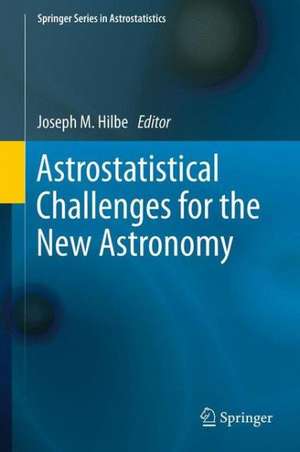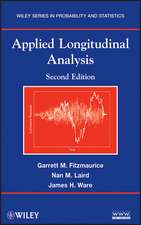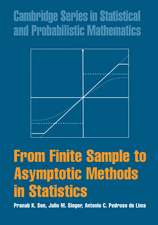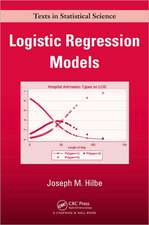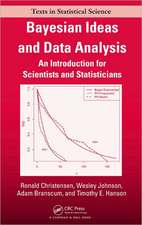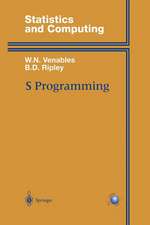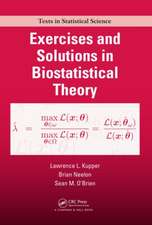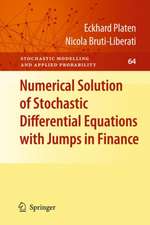Astrostatistical Challenges for the New Astronomy: Springer Series in Astrostatistics, cartea 1
Editat de Joseph M. Hilbeen Limba Engleză Hardback – 7 noi 2012
| Toate formatele și edițiile | Preț | Express |
|---|---|---|
| Paperback (1) | 385.62 lei 43-57 zile | |
| Springer – 13 dec 2014 | 385.62 lei 43-57 zile | |
| Hardback (1) | 391.61 lei 43-57 zile | |
| Springer – 7 noi 2012 | 391.61 lei 43-57 zile |
Preț: 391.61 lei
Nou
Puncte Express: 587
Preț estimativ în valută:
74.93€ • 78.45$ • 62.00£
74.93€ • 78.45$ • 62.00£
Carte tipărită la comandă
Livrare economică 07-21 aprilie
Preluare comenzi: 021 569.72.76
Specificații
ISBN-13: 9781461435075
ISBN-10: 1461435072
Pagini: 252
Ilustrații: XIV, 238 p.
Dimensiuni: 155 x 235 x 18 mm
Greutate: 0.5 kg
Ediția:2013
Editura: Springer
Colecția Springer
Seria Springer Series in Astrostatistics
Locul publicării:New York, NY, United States
ISBN-10: 1461435072
Pagini: 252
Ilustrații: XIV, 238 p.
Dimensiuni: 155 x 235 x 18 mm
Greutate: 0.5 kg
Ediția:2013
Editura: Springer
Colecția Springer
Seria Springer Series in Astrostatistics
Locul publicării:New York, NY, United States
Public țintă
ResearchCuprins
Joseph Hilbe, Jet Propulsion Laboratory and Arizona State University, Astrostatistics: A brief history and view to the future.- Thomas Loredo, Cornell Univ, Bayesian astrostatistics: A backward look to the future.- Stefano Andreon, INAF-Osservatorio Astronomico di Brera, Italy, Understanding better (some) astronomical data using Bayesian methods.- Martin Kunz, Institute for Theoretical Physics, Univ of Geneva, BEAMS: separating the wheat from the chaff in supernova analysis.- Benjamin Wandelt, Institut d'Astrophysique de Paris, Université Pierre et Marie Curie, France, Cosmostatistics.- Roberto Trotta, Astrophysics Group, Dept of Physics, Imperial College London (with Farhan Feroz (Cambridge), Mike Hobson (Cambridge), and Roberto Ruiz de Austri (Univ of Valencia, Spain), Recent advances in Bayesian inference in cosmology and astroparticle physics thanks to the Multinest Algorithm.- Phillip Gregory, Department of Astronomy, Univ of British Columbia, Canada, Extrasolar planets via Bayesian model fitting.- Marc Henrion, Dept of Mathematics, Imperial College, London, UK (with Daniel Mortlock (Imperial), Axel Gandy (Imperial), and David J. Hand (Imperial)), Subspace methods for anomaly detection in high dimensional astronomical databases.- Asis Kumar Chattopadhyay, Dept of Statistics, Univ of Calcutta, India (with Tanuka Chattyopadhyay, Tuli De, and Saptarshi Mondal), Independent Component Analysis for dimension reduction classification: Hough transform and CASH Algorithm.- Marisa March, Astrophysics Group, Dept of Physics, Imperial College London (with Roberto Trotta), Improved cosmological constraints from a Bayesian hierarchical model of supernova type Ia data
Recenzii
From the book reviews:
“This publication is a timely survey of advanced data science techniques that are increasingly common and necessary in the data-rich scientific discipline of astronomical research. … Astronomers and their statistician collaborators will benefit from this book. … this book is a very worthy research companion, one that should be kept within reach by any researcher in the field.” (Kirk Borne, Mathematical Reviews, June, 2014)
“This is an excellent book, covering advances in statistical analysis of astronomical data. … This book will be of great interest to researchers whose inference problems may go beyond what a standard MCMC algorithm can handle, or those who want a detailed but comprehensible summary of some recent advances in astronomical data analysis. It is highly recommended.” (Alan Heavens, The Observatory, Vol. 133 (1236), October, 2013)
The chapters represent the state-of-the-art of statistical work in astronomy. The book opens with a historical overview of the many intersections between astronomy and statistics,written by Professor Hilbe...it offers an exciting synthesis of two vibrant research fields—astronomy/cosmology and Bayesian statistics...The content of the book is rich and varied. There are chapters on the analysis of supernova data from the Sloan Digital Sky Survey and of the large scale (galaxy) structure of the universe; on the search for new planets; on the classification of stars and galaxies; on the detection of anomalous sources, which can lead to the discovery of new astronomical objects. From the statistical perspective, the reader will encounter Bayesian hierarchical models, nonlinear models, a variety of classification procedures, Gaussian random fields, and efficient posterior distribution samplers. In terms of both the applications and the methodologies discussed, this is an advanced text, very much on the forefront of research.Technometrics, 56:1
“This publication is a timely survey of advanced data science techniques that are increasingly common and necessary in the data-rich scientific discipline of astronomical research. … Astronomers and their statistician collaborators will benefit from this book. … this book is a very worthy research companion, one that should be kept within reach by any researcher in the field.” (Kirk Borne, Mathematical Reviews, June, 2014)
“This is an excellent book, covering advances in statistical analysis of astronomical data. … This book will be of great interest to researchers whose inference problems may go beyond what a standard MCMC algorithm can handle, or those who want a detailed but comprehensible summary of some recent advances in astronomical data analysis. It is highly recommended.” (Alan Heavens, The Observatory, Vol. 133 (1236), October, 2013)
The chapters represent the state-of-the-art of statistical work in astronomy. The book opens with a historical overview of the many intersections between astronomy and statistics,written by Professor Hilbe...it offers an exciting synthesis of two vibrant research fields—astronomy/cosmology and Bayesian statistics...The content of the book is rich and varied. There are chapters on the analysis of supernova data from the Sloan Digital Sky Survey and of the large scale (galaxy) structure of the universe; on the search for new planets; on the classification of stars and galaxies; on the detection of anomalous sources, which can lead to the discovery of new astronomical objects. From the statistical perspective, the reader will encounter Bayesian hierarchical models, nonlinear models, a variety of classification procedures, Gaussian random fields, and efficient posterior distribution samplers. In terms of both the applications and the methodologies discussed, this is an advanced text, very much on the forefront of research.Technometrics, 56:1
Notă biografică
Joseph M. Hilbe is President of the International Astrostatistics Association, and chair of the ISI astrostatistics committee. ISI is the International Statistical Institute, the world association of statisticians. Prof. Hilbe is also editor-in-chief of the Springer Series in Astrostatistics and chaired the World Statistics Congress invited and special topics sessions from which eight of the book’s monographs originated. An elected Fellow of the American Statistical Association and Elected Member of the ISI, Professor Hilbe is author of several leading texts in statistical modeling, including “bestsellers’’ Negative Binomial Regression, 2nd ed. (2011, Cambridge Univ Press) and Logistic Regression Models (2009, Chapman & Hall/CRC) among others.
Textul de pe ultima copertă
Astrostatistical Challenges for the New Astronomy presents a collection of monographs authored by several of the disciplines leading astrostatisticians, i.e. by researchers from the fields of statistics and astronomy-astrophysics having in interest in the statistical analysis of astronomical and cosmological data. Eight of the ten monographs are enhancements of presentations given by the authors as invited or special topics in astrostatistics papers at the ISI World Statistics Congress (2011, Dublin, Ireland). The opening chapter, by the editor, was adapted from an invited seminar given at Los Alamos National Laboratory (2011) on the history and current state of the discipline; the second chapter by Thomas Loredo was adapted from his invited presentation at the Statistical Challenges in Modern Astronomy V conference (2011, Pennsylvania State University), presenting insights regarding frequentist and Bayesian methods of estimation in astrostatistical analysis. The remaining monographs are research papers discussing various topics in astrostatistics. The monographs provide the reader with an excellent overview of the current state astrostatistical research, and offer guidelines as to subjects of future research.
Caracteristici
Provides a concise introduction to statistical astronomy in the context of many recent discoveries Details various traditional and non-traditional methodologies for analyzing and interpreting large scale data sets in this field Special topics such as super-nova and extra-solar planets analysis covered in detail
